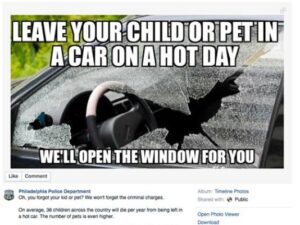What Are the Hot Car Laws Across the Country?
Like many laws, Hot Car laws vary by state and municipalities. At least 23 states and many municipalities have laws that specifically address the problem of animals confined in cars in extreme temperatures. However, there doesn’t need to be a specific law on the books to charge someone with animal cruelty for leaving a dog in a hot car – even if the dog ends up being OK – and indeed, it happens all the time and in any state.
The 23 coolest states in the country for dogs are:
- Arizona > A.R.S. § 13-2910
- California > Cal. Penal Code § 597.7
- Delaware > 11 Del.C. § 1325(b)(6)
- Florida > West’s F. S. A. § 768.139
- Illinois > 510 ILCS 70/7.1
- Maine > 7 MRSA § 4019
- Maryland > MD Code, Transportation § 21-1004.1
- Minnesota > M.S.A. § 346.57
- Nevada > N.R.S. 574.195
- New Hampshire > N.H. Rev. Stat. 644:8-aa
- New Jersey > N.J.S.A. 4:22-26c
- New York > NY Agri. & Mkts. § 353-d
- North Carolina > NC ST § 14-363.3
- North Dakota > NDCC ST 36-21.1-03.1
- Ohio > 959.133 and 2151.88
- Rhode Island > 2014-S 2312A and 2014-H 7496A
- South Dakota > S D C L § 40-1-36
- Tennessee > T.C.A. § 29-34-209
- Vermont > 13 V.S.A. § 386
- Virginia > Va. Code Ann. § 3.2-6504.1
- Washington > RCWA 16.52.340
- West Virginia > W. Va. Code, § 61-8-19E
- Wisconsin > W. S. A. 895.484
These laws, to various extents, spell out the condition under which the animal can be confined or left unattended in a stationary vehicle. To violate the law, the conditions inside the vehicle must be such that physical injury or death is likely to result. As this site goes to great lengths to point out, because of the differences in the way dogs deal with heat, and the Greenhouse Effect, leaving a dog in a hot parked car can easily result in injury or death in a matter of minutes.
Along with spelling out penalties, these laws often authorize law enforcement and animal control officials to use whatever means reasonably necessary to enter a vehicle and remove an animal in danger. Provisions for a by-stander or good Samaritan breaking a window or trespassing on private property (a vehicle) to remove an animal (still seen as property in the eyes of the law) are not covered in most of these hot car laws. That’s why it is so important to call 911 if you see a dog in a hot car – because even in states without this provision, officers are in a better position to take crucial action to save a dog’s life without as much likelihood of repercussion.
However, a landmark law went into effect July 1, 2015 in Tennessee (the first in the nation) that protects people who smash windows or jimmy locks in order to save animals from over-heating in cars from being sued by the car’s owner. Since then, the states of Ohio, Wisconsin, Michigan, Florida and Vermont have joined them with legislation pending in New York and Massachusetts. These laws provide “Good Samaritans” legal protections if they break into a car to save pets, if they follow the steps laid out in the law and act in “good faith.” For example, they must make sure the car is locked, the animal or child is in danger if not immediately removed, call the police and remain on the scene. So again, best to call 911 right away.
California is considering a similar law to help protect rescuers.

A powerful post by the Philadelphia Police Department reminding anyone who see a dog in a hot car that calling 911 is often the best action to take.
Additionally, in any state, anyone who leaves their dog in a hot car is still subject to fines (up to $10,000 in some cases) and jail time. Even in the 32 states without hot car specific laws, most lawmakers consider leaving an animal in an enclosed hot car to be animal cruelty. A quick search through numerous news stories on dogs being left in hot cars will highlight the fact that many guardians return from their shopping trip only to be charged with animal cruelty, even if the dog turns out to be OK.
If you are lucky enough to live in a state with a hot car law, use it to your advantage. Not all people who leave their dog in a hot car take kindly to being informed of the danger their dog faces. Some are downright nasty! Know the law in your state (or city) and let the person know that it is against the law to leave their animal inside a hot car. This can sometimes hold more weight for someone who is adamant they have done nothing wrong.
Knowing your law also comes in handy with calling the police. Not all police or 911 dispatchers know their laws – remember, they have to know hundreds of laws and they’re changing all the time. If you’re able to cite the hot car law and number, you can help them to quickly understand that you are a credible witness, a law is being violated and speed is of the utmost importance.
If you have seen a dog in a hot car and are following the steps to help, knowing the law can also help when contacting mall security or a store manager when a dog is spotted in a hot car in their parking lot. You can let them know that a) it is against the law to leave a dog in a hot car and b) that you’ve called the police or animal control, who is on their way. This will again, help them understand that you know about this issue and will also hopefully spur them to act quickly to help find the dog’s guardian or get the dog out of the car. Many times, on site security or managers can act quicker than it takes for help to arrive. (And if you live in Maine, note that state’s hot car law specifically calls out that a “…licensed security guard may take all steps that are reasonably necessary to remove an animal from a motor vehicle…” Let any security guard know this – as they probably do not – so that they may take decisive action, quickly.)
The cool people at Michigan State University’s Animal Legal & Historical Center have created an easy-to-view chart of the hot car laws. If you have questions on your local laws, contact your city or county government.


